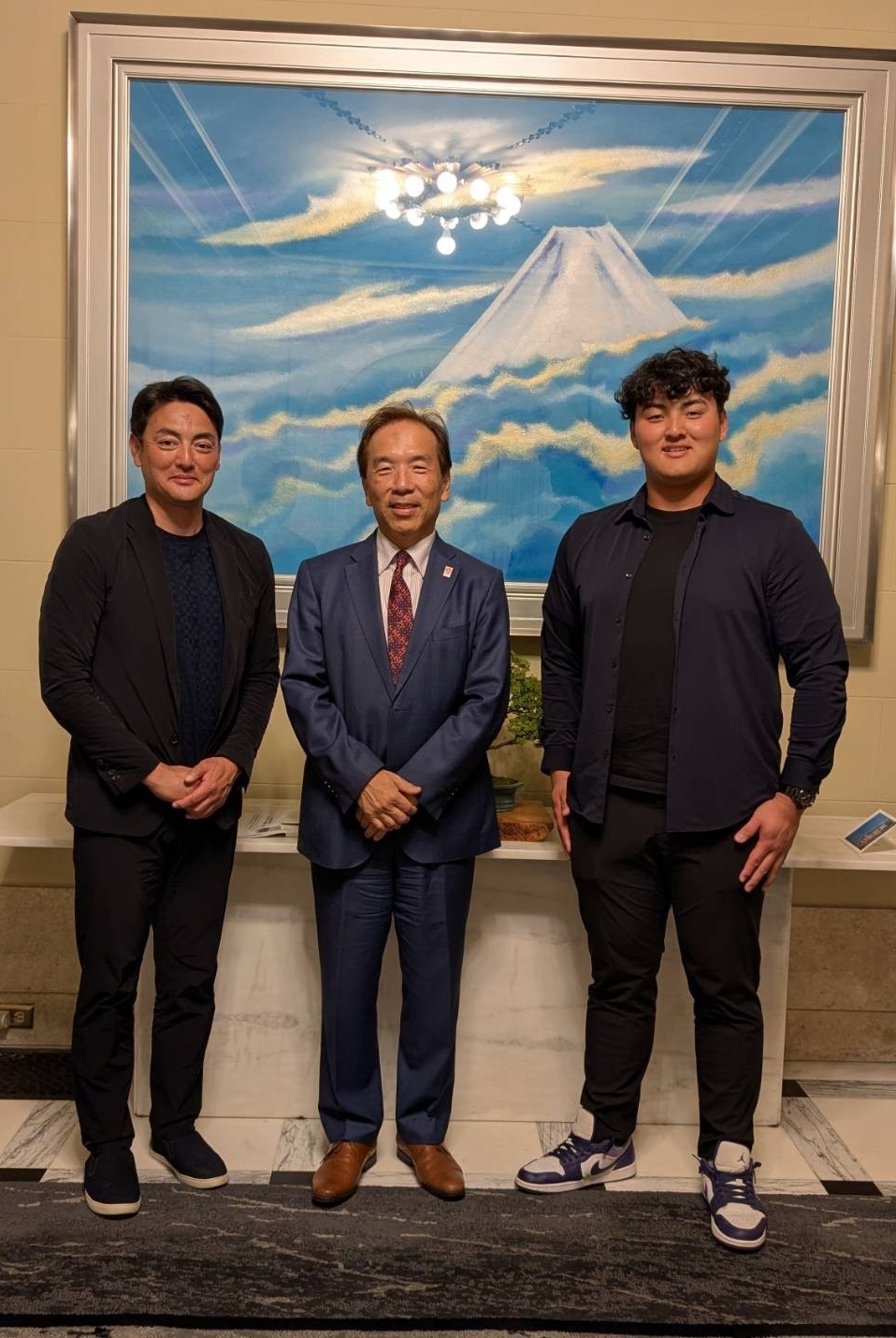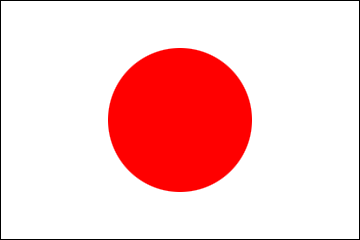From the Desk of Consul General Osumi
2025/3/24

Essay Vol. 19
~Great Expectations for Rintaro Sasaki~
~Great Expectations for Rintaro Sasaki~
March 24, 2025
Yo Osumi
Consul General of Japan in San Francisco
Yo Osumi
Consul General of Japan in San Francisco
At the end of February, my family and I went to watch a baseball game at Stanford University, where Rintaro Sasaki was playing. He graduated from Hanamaki Higashi High School in Iwate Prefecture in March 2024, enrolled at Stanford in September, and has been starting in the college league games that began in mid-February this year. During the campus broadcast, each player's theme song is played when it's their turn to bat. When the announcer called out, “Batting third, first baseman, Rintaro Sasaki!” a slightly retro Japanese pop song echoed through the California sky. Facing the powerful swings of Sasaki, the opposing pitcher seemed a bit overwhelmed. Sasaki drew two walks and had two hits in three at-bats—a strong performance. We also had the chance to meet his father, Hiroshi Sasaki, the head coach of Hanamaki Higashi's baseball team, and Hideki Kuriyama, who happened to be visiting. Kuriyama led Japan’s national team to an emotional victory in the 2023 World Baseball Classic.
Yusei Kikuchi of the Los Angeles Angels, Shohei Ohtani of the Dodgers, and Rintaro Sasaki all graduated from Hanamaki Higashi High School. About two years ago, when we traveled as a family to the Tohoku region, we got off at Shin-Hanamaki Station on the Tohoku Shinkansen. I remember being surprised to find a display area for Kikuchi and Ohtani inside the station at dusk. The night sky was stunning. Above us, the world of Miyazawa Kenji’s Night on the Galactic Railroad seemed to stretch out, and I felt as though I could travel the galaxy aboard the celestial train. The setting of Tono Monogatari, a collection of folk tales compiled by Kunio Yanagita, is also not far away. It’s deeply moving that a player like Sasaki has emerged like a comet from such a beautifully preserved region of Japan, 150 years after baseball was introduced there. I also find myself fascinated by Coach Sasaki's ability to nurture young talent.
Mr. Kuriyama, the coach of Japanese national team who won the World Baseball Classic 2023 and whom we met at the stadium, was extremely humble and gracious . He said, “Rintaro is someone who will carry the future of Japanese sports 30 years from now, so please guide him in any way you can.” Coach Sasaki was equally modest, yet he had a powerful educational philosophy: allow children to dream, help them write down detailed plans to achieve those dreams, and guide them to carry them out. Adults must do everything they can to create an environment where children can grow.
I felt that Rintaro Sasaki possessed the qualities essential for personal growth: humility, a broad perspective, and an expansive outlook. He appeared to be living a fulfilling student life at Stanford, fully embracing the privilege of studying there while thoughtfully considering not just his baseball career, but his life beyond it. According to Coach Sasaki, Rintaro was named after the great Bakumatsu-era figure Rintaro Katsu (better known as Katsu Kaishu). Interestingly, Katsu Kaishu visited San Francisco in 1860 aboard the Kanrin Maru, and Sasaki’s family visited the Kanrin Maru Centennial Monument at the entrance to the San Francisco Bay (mentioned in the 16th essay in this series).
To Rintaro, I said: “I know you’re busy with both your studies and baseball, so I won’t ask too much of you now. But I hope you will one day serve the public as a future leader. The fact that modern Japanese people can live here without major difficulty is thanks to our predecessors, especially the Japanese Americans who strove to establish their place in society. Since fate has brought you to live here, I encourage you to visit places connected to the Japanese American legacy and actively share your experiences to set a positive example.” Rintaro kindly agreed.
In addition to Rintaro Sasaki, a notable number of young people from Japan are studying abroad here. I sense broad agreement from the community on the importance of supporting the growth of the next generation as a responsibility of adults. The Consulate General is also actively engaged in this effort, for example, by giving talks to junior and senior high school students visiting from Japan on short-term programs. Similarly, we are enthusiastically supporting Japanese language classes in local schools.
Lastly, let me share a brief story about the connection between Rintaro Sasaki’s hometown, Kitakami City in Iwate Prefecture, and California. The East Bay city of Concord is a sister city of Kitakami. In October last year, marking the 50th anniversary of their sister city relationship, a delegation led by Kitakami Mayor Hirofumi Yaegashi visited Concord. All members of the delegation, including the mayor, stayed in the homes of local American families and deepened their exchanges. I attended the commemorative dinner and presented the Consul General’s Commendation to the Concord Ambassadors, a volunteer group that has been devoted to this relationship over the years. In my speech, I told the mayor of Concord and others: “There is a baseball player at Stanford University named Rintaro Sasaki, who comes from Kitakami City. During his high school years, he hit 140 home runs—a Japanese record, and more than Shohei Ohtani. I believe he will become quite famous in the U.S. in the future. He may add a special flourish to the sister city ties between Kitakami and Concord.”
Lastly, let me share a brief story about the connection between Rintaro Sasaki’s hometown, Kitakami City in Iwate Prefecture, and California. The East Bay city of Concord is a sister city of Kitakami. In October last year, marking the 50th anniversary of their sister city relationship, a delegation led by Kitakami Mayor Hirofumi Yaegashi visited Concord. All members of the delegation, including the mayor, stayed in the homes of local American families and deepened their exchanges. I attended the commemorative dinner and presented the Consul General’s Commendation to the Concord Ambassadors, a volunteer group that has been devoted to this relationship over the years. In my speech, I told the mayor of Concord and others: “There is a baseball player at Stanford University named Rintaro Sasaki, who comes from Kitakami City. During his high school years, he hit 140 home runs—a Japanese record, and more than Shohei Ohtani. I believe he will become quite famous in the U.S. in the future. He may add a special flourish to the sister city ties between Kitakami and Concord.”
Recommended Information
- Essay Vol.1 (2023.11)
- Essay Vol.2 (2023.11)
- Essay Vol.3 (2023.12)
- Essay Vol.4 (2024.01)
- Essay Vol.5 (2024.02)
- Essay Vol.6 (2024.03)
- Essay Vol.7 (2024.04)
- Essay Vol.8 (2024.04)
- Essay Vol.9 (2024.05)
- Essay Vol.10 (2024.06)
- Essay Vol.11 (2024.07)
- Essay Vol.12 (2024.08)
- Essay Vol.13 (2024.09)
- Essay Vol.14 (2024.10)
- Essay Vol.15 (2024.10)
- Essay Vol.16 (2024.11-12)
- Essay Vol.17 (2025.01)
- Essay Vol.18 (2025.02)
- Essay Vol.20 (2025.04)
- Essay Vol.21 (2025.05)
- Essay Vol.22 (2025.06)
- Essay Vol.23 (2025.07)
- Essay Vol.24 (2025.08)
